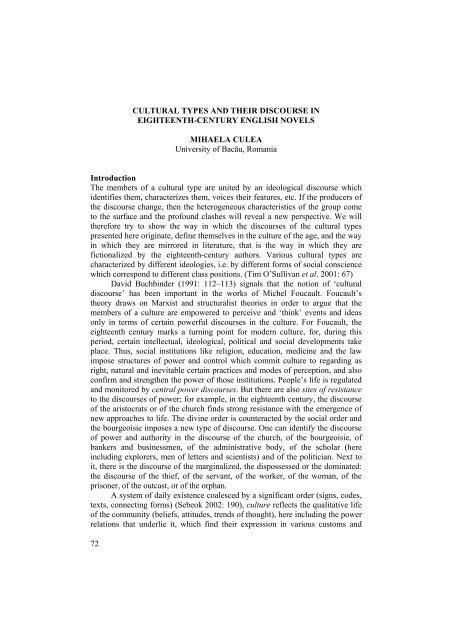culture, subculture and counterculture - Facultatea de Litere
culture, subculture and counterculture - Facultatea de Litere
culture, subculture and counterculture - Facultatea de Litere
Create successful ePaper yourself
Turn your PDF publications into a flip-book with our unique Google optimized e-Paper software.
CULTURAL TYPES AND THEIR DISCOURSE IN<br />
EIGHTEENTH-CENTURY ENGLISH NOVELS<br />
MIHAELA CULEA<br />
University of Bacău, Romania<br />
Introduction<br />
The members of a cultural type are united by an i<strong>de</strong>ological discourse which<br />
i<strong>de</strong>ntifies them, characterizes them, voices their features, etc. If the producers of<br />
the discourse change, then the heterogeneous characteristics of the group come<br />
to the surface <strong>and</strong> the profound clashes will reveal a new perspective. We will<br />
therefore try to show the way in which the discourses of the cultural types<br />
presented here originate, <strong>de</strong>fine themselves in the <strong>culture</strong> of the age, <strong>and</strong> the way<br />
in which they are mirrored in literature, that is the way in which they are<br />
fictionalized by the eighteenth-century authors. Various cultural types are<br />
characterized by different i<strong>de</strong>ologies, i.e. by different forms of social conscience<br />
which correspond to different class positions. (Tim O’Sullivan et al. 2001: 67)<br />
David Buchbin<strong>de</strong>r (1991: 112–113) signals that the notion of ‘cultural<br />
discourse’ has been important in the works of Michel Foucault. Foucault’s<br />
theory draws on Marxist <strong>and</strong> structuralist theories in or<strong>de</strong>r to argue that the<br />
members of a <strong>culture</strong> are empowered to perceive <strong>and</strong> ‘think’ events <strong>and</strong> i<strong>de</strong>as<br />
only in terms of certain powerful discourses in the <strong>culture</strong>. For Foucault, the<br />
eighteenth century marks a turning point for mo<strong>de</strong>rn <strong>culture</strong>, for, during this<br />
period, certain intellectual, i<strong>de</strong>ological, political <strong>and</strong> social <strong>de</strong>velopments take<br />
place. Thus, social institutions like religion, education, medicine <strong>and</strong> the law<br />
impose structures of power <strong>and</strong> control which commit <strong>culture</strong> to regarding as<br />
right, natural <strong>and</strong> inevitable certain practices <strong>and</strong> mo<strong>de</strong>s of perception, <strong>and</strong> also<br />
confirm <strong>and</strong> strengthen the power of those institutions. People’s life is regulated<br />
<strong>and</strong> monitored by central power discourses. But there are also sites of resistance<br />
to the discourses of power; for example, in the eighteenth century, the discourse<br />
of the aristocrats or of the church finds strong resistance with the emergence of<br />
new approaches to life. The divine or<strong>de</strong>r is counteracted by the social or<strong>de</strong>r <strong>and</strong><br />
the bourgeoisie imposes a new type of discourse. One can i<strong>de</strong>ntify the discourse<br />
of power <strong>and</strong> authority in the discourse of the church, of the bourgeoisie, of<br />
bankers <strong>and</strong> businessmen, of the administrative body, of the scholar (here<br />
including explorers, men of letters <strong>and</strong> scientists) <strong>and</strong> of the politician. Next to<br />
it, there is the discourse of the marginalized, the dispossessed or the dominated:<br />
the discourse of the thief, of the servant, of the worker, of the woman, of the<br />
prisoner, of the outcast, or of the orphan.<br />
A system of daily existence coalesced by a significant or<strong>de</strong>r (signs, co<strong>de</strong>s,<br />
texts, connecting forms) (Sebeok 2002: 190), <strong>culture</strong> reflects the qualitative life<br />
of the community (beliefs, attitu<strong>de</strong>s, trends of thought), here including the power<br />
relations that un<strong>de</strong>rlie it, which find their expression in various customs <strong>and</strong><br />
72












